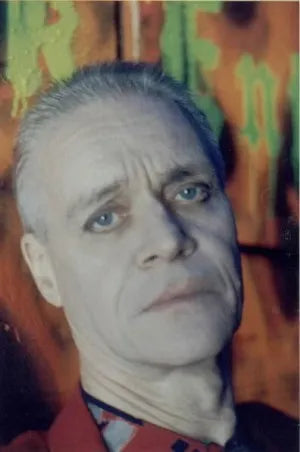


Kim Fowley Vinyl Records & Discography
Kim Fowley Biography
Who is Kim Fowley? A Brief Career Overview
Kim Fowley, an iconic name in rock & roll, is celebrated as a multifaceted music industry player--singer, songwriter, producer, manager, and even a disc jockey. Known for his contributions to classic garage rock and protopunk genres, Fowley is often regarded as one of the most colorful figures in the music landscape. He was instrumental in shaping the sounds of the 1960s and '70s pop culture with his unique flair for spotting talent and crafting hits. Kim's indelible mark on the music industry includes pioneering roles for various bands, most notably managing the groundbreaking all-girl rock band, The Runaways. His eclectic style and bold ventures into vinyl have captivated collectors, adding to his legacy as not just an artist but a true connoisseur of the vinyl culture.
Kim Fowley's Early Life and Background
Born on July 27, 1942, in Los Angeles, California, Kim Fowley was steeped in the world of performing arts from a young age, being the son of actor Douglas Fowley. His upbringing in a vibrant cultural environment was punctuated by early exposure to music. The sounds of the late 1950s resonated through his childhood, paving the way for a passion for music that burgeoned amidst the L.A. counterculture. Fowley's formative years were marked by his battle with polio and his subsequent drive to find expression through music, whether through playing instruments or immersing himself in the burgeoning rock scene. This rich tapestry of experiences greatly influenced his later love affair with vinyl records, becoming part of a rare collecting community that appreciated the heritage of the music he helped create.
The Musical Influences That Shaped Kim Fowley's Sound
Kim Fowley drew inspiration from a diverse array of artists and genres, reflecting the eclectic musical culture of the 1960s. He was particularly influenced by pioneers like Frank Zappa, whose innovative approach to composition resonated with Fowley's own experimental tendencies. Classic rock sounds, garage rock rhythms, and the raw energy of protopunk served as backdrops to his creative endeavors. Fowley's collection of vinyl records featured early rock icons and innovative labels that shaped his artistic vision, fostering a rich understanding of sound that became evident in his songwriting and productions. This foundation allowed him to create music that was not only commercially viable but also filled with character and wit.
How Kim Fowley Entered the Music Industry
Fowley's foray into the music industry began in the late 1950s, following a stint with polio that instilled a fierce determination within him. He started his career managing local bands, harnessing his promotional skills to spotlight their music. Notably, his early collaboration with drummer Sandy Nelson led to initial recording efforts. His creative journey took off when he produced the Top 20 hit "Cherry Pie." Despite numerous struggles typical of emerging artists, including a lack of adequate funding to promote vinyl releases, Fowley's relentless spirit and willingness to innovate allowed him to connect with established artists and cultivate a robust network throughout the industry. His early works and collaborations set the stage for a distinctive sound that would captivate music lovers and vinyl collectors alike.
Kim Fowley's Breakthrough and Rise to Fame
Fowley's breakthrough came with the success of the novelty hit "Alley Oop" in 1960. This single, released under the fictional band name The Hollywood Argyles, showcased his knack for creating catchy tunes that hooked listeners. The subsequent acclaim solidified his footprint in the music scene, allowing him to expand his influence as a producer and songwriter. His work with The Runaways marked a turning point; their self-titled debut album gained significant traction and remains a beloved classic among vinyl enthusiasts. Fowley's ability to cultivate talent and craft memorable hits earned him recognition and respect, resulting in opportunities to work with an array of successful artists and bands, further enhancing his legacy within the vinyl collection community.
How Personal Life Shaped Kim Fowley's Music
Fowley's personal experiences profoundly influenced his music and artistic expression. His tumultuous relationships and the challenges he faced throughout his career often seeped into his songwriting, creating poignant lyrics that resonated with listeners. He fostered a fervent connection with his artists, empowering them to explore emotional depths in their music. Additionally, Fowley's involvement in social causes and the feminist movement through The Runaways mirrored his progressive outlook and added layers to his already rich artistic narrative. Despite the controversies that arose during his career, his unyielding passion for music and advocacy for artists' rights reflected a complex but thoughtful approach toward his legacy.
Discography
Kim Fowley's Current Status and Legacy in the Music Industry
Though Kim Fowley passed away on January 15, 2015, his spirit lives on through the music and artists he inspired. His recent posthumous releases, including compilations of his works and collaborations with contemporary artists, continue to captivate audiences. Fowley is remembered for his evangelistic approach to promoting and producing music, leaving an indelible mark on future generations of musicians. He garnered several posthumous accolades that celebrate his contributions to rock music and vinyl culture. Fowley's legacy is characterized by his fearless experimentation, undulating creativity and an unwavering belief in the transformative power of music--elements that ensure his enduring relevance in the pantheon of rock history.
Shop the Store
Exclusive 15% Off for Teachers, Students, Military members, Healthcare professionals & First Responders - Get Verified!































